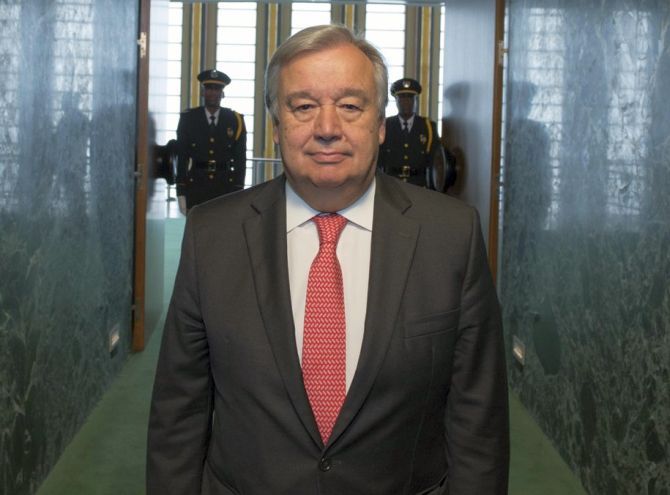Portugal's former Prime Minister Antonio Guterres was on Thursday appointed as the next Secretary-General of the United Nations by the General Assembly.

The 193 member states of the powerful General Assembly adopted the resolution by acclamation, appointing 67-year-old Guterres as the 9th UN Secretary-General to take over from Ban Ki-moon, whose tenure will end on December 31.
The 15-nation UN Security Council had last week voted for Guterres by acclamation and forwarded his name to the General Assembly.
Guterres, who was Prime Minister of Portugal from 1995 to 2002, and the UN High Commissioner for Refugees from June 2005 to December 2015, will assume his new role on January 1, 2017 for a five-year term that can be renewed by Member States for an additional five years.
Guterres had emerged as the front-runner in all the six informal polls conducted in the Council to select the Secretary-General amid a heightened call by several UN member states and civil society organisations to elect a woman chief for the world body, which has had a man at its helm for all the 71 years of its existence.
Ban, however, described him as "a superb choice" for the position of Secretary-General, noting that the two had worked closely during Guterres' "long and outstanding tenure" as the UN High Commissioner for Refugees.
"Secretary-General-elect Guterres is well known to all of us in the hall. But he is perhaps best known where it counts most: on the frontlines of armed conflict and humanitarian suffering," Ban said referring to Guterres' time as head of the UN refugee agency.
He had last week said Guterres "showed deep compassion for the millions of people who have been forced from their homes. He worked around-the-clock to mount effective operations to come to their assistance".
"His past experience as Prime Minister of Portugal, his wide knowledge of world affairs and his lively intellect will serve him well in leading the United Nations in a crucial period," he had said.
Speaking in Lisbon shortly after his selection last week, Guterres had expressed "gratitude and humility" and had vowed to "serve" those most vulnerable, including victims of conflict, terrorism, violation of rights and poverty.
In his vision statement submitted in April, he had stressed that the values of peace, justice, human dignity, tolerance and solidarity enshrined in the Charter are central to all cultures and religions in the world and are reflected
in the Holy Books - from the "Upanishads" to the Quran and the Gospels.
Guterres had said the Secretary-General of the UN should "actively, consistently and tirelessly" exercise his good offices and mediation capacity as an honest broker, bridge builder and messenger of peace.
He had noted that prevention is also crucial to combat terrorism and the international community has the "legal right and moral duty" to act collectively to put an end to terrorism "in all its forms and manifestations".
Under procedures for appointing the world body's new chief, after the recommendation is transmitted from the Council to the Assembly, a draft resolution is issued for the Assembly to take action.
The last five Secretaries-General were appointed by the Assembly through a resolution adopted by consensus. A vote takes place only if a Member State requests it and a simple majority of those voting would be required for the Assembly to adopt the resolution. If a vote is taken, it will be by secret ballot.
The UN Charter, signed in 1945 as the foundation of the Organisation, says relatively little about how a Secretary-General is to be selected, aside from Article 97, which notes that the candidate "shall be appointed by the General Assembly upon the recommendation of the Security Council".
In addition to Guterres, 12 other candidates were in the running for the position. Action in the Assembly will culminate an historic process: the selection of a new United Nations Secretary-General, traditionally decided behind closed-doors by a few powerful countries, had for the first time, involved public discussions with each candidate campaigning for the world's top diplomatic post.
Russia's envoy to the UN and President of the Council for October Vitaly Churkin had told reporters that Guterres has "many strong qualities" to lead the UN.
"I sensed in my conversations with other members of the Security Council and various members of the UN that Guterres has great UN credentials having been High Commissioner for Refugees for 10 years," he had said, adding in this position Guterres has seen "most gruesome conflicts" the world has to deal with.
"He is a person who talks to everyone, listens to everyone and speaks his mind. Very outgoing person so i think it was a great choice," Churkin had said last week.
The informal briefings between the candidates, UN Member States and civil society representatives kicked off in April, when the first three candidates presented their 'vision statements' and answered questions on how they would promote sustainable development, improve efforts to create peace, protect human rights, and deal with huge humanitarian catastrophes should they be selected to lead the Organization.
In addition, this past July, the UN held its first-ever globally televised and webcast townhall-style debate in the General Assembly Hall, where the confirmed candidates at the time took questions from diplomats and the public at large.
Photograph: UN Photo










 © 2025
© 2025